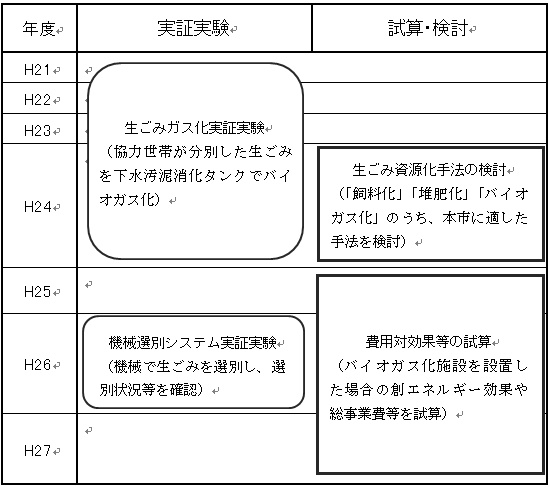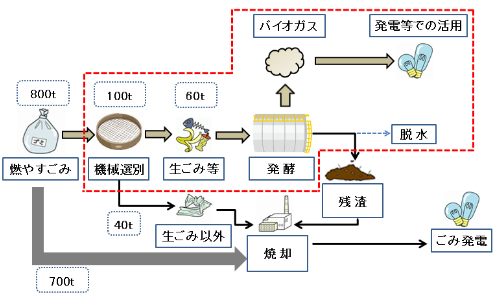- Yokohama-shi Top Page
- Living and Procedures
- Housing and Living
- Waste and recycling
- Recycling of kitchen garbage
- Consideration of biogasification of kitchen garbage
Here's the text.
Consideration of biogasification of kitchen garbage
Last Updated March 31, 2022
In the Yokohama 3R Dream Plan, we are making efforts to reduce the amount of kitchen garbage, focusing on reducing the amount of reduction, but the remaining kitchen garbage is the largest in burnable garbage, accounting for more than 30%.
History of Examining

Estimation of cost-effectiveness
Based on the assumption that a biogasification facility will be added to the incineration plant, the energy creation effect and cost were estimated, and compared with the case where only the incineration plant is installed.
kitchen garbage (including paper) is selected from the collected burnable garbage by machine and then gasified through various processes. The generated gas is extracted by power generation, etc.
On the other hand, most of the burnable garbage, which was not machine-selected, is incinerated at factories, and is used to generate energy as electricity.

If a biogasification facility is installed and the gas is generated by the fuel cell with the highest energy-generating effect, energy creation is expected to increase by approximately 1,600 kWh/day compared to the case where a biogasification facility is not installed.
This is equivalent to the amount of electricity used by approximately 130 households.
On the other hand, the total project cost will be approximately 10.5 billion yen (approximately 500 million yen per year) over 20 years compared to the absence of biogasification facilities.
As described above, we believe that it is difficult to introduce biogasification facilities at present because the current biogasification technology has a large cost disadvantage due to an increase in total project costs compared to energy creation effects.
Future Initiatives
Promote initiatives such as the results of other cities where the facilities are operating, surveys on manufacturers' biogasification technology, and information gathering on national subsidy systems, and feasibility in a long-term span, such as when renewing incineration plants in the future. I will explore.
Inquiries to this page
Policy Coordination Division, Policy Coordination Division, Resources and Waste Recycling Bureau Policy Coordination Department
Telephone: 045-671-4565
Telephone: 045-671-4565
Fax: 045-550-4239
Email address: sj-chousa@city.yokohama.jp
Page ID: 190-287-083







